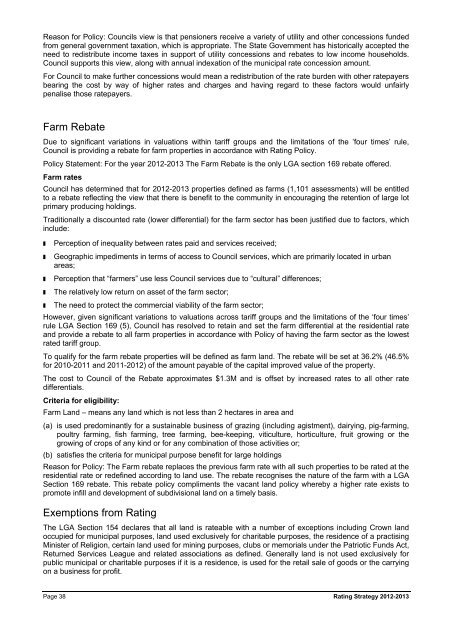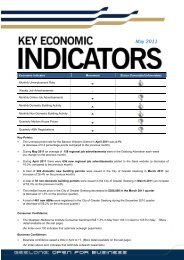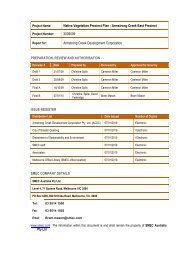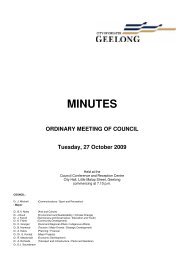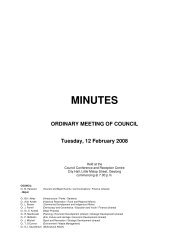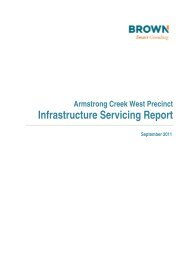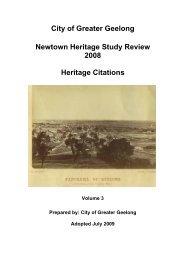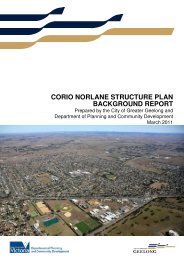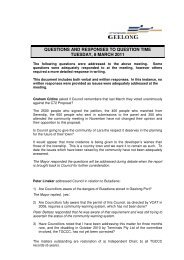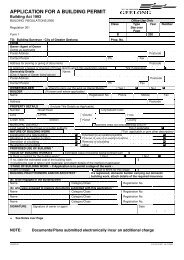CITY OF GREATER GEELONG 2012-2013 Rating StRategy
CITY OF GREATER GEELONG 2012-2013 Rating StRategy
CITY OF GREATER GEELONG 2012-2013 Rating StRategy
You also want an ePaper? Increase the reach of your titles
YUMPU automatically turns print PDFs into web optimized ePapers that Google loves.
Reason for Policy: Councils view is that pensioners receive a variety of utility and other concessions funded<br />
from general government taxation, which is appropriate. The State Government has historically accepted the<br />
need to redistribute income taxes in support of utility concessions and rebates to low income households.<br />
Council supports this view, along with annual indexation of the municipal rate concession amount.<br />
For Council to make further concessions would mean a redistribution of the rate burden with other ratepayers<br />
bearing the cost by way of higher rates and charges and having regard to these factors would unfairly<br />
penalise those ratepayers.<br />
Farm Rebate<br />
Due to significant variations in valuations within tariff groups and the limitations of the ’four times’ rule,<br />
Council is providing a rebate for farm properties in accordance with <strong>Rating</strong> Policy.<br />
Policy Statement: For the year <strong>2012</strong>-<strong>2013</strong> The Farm Rebate is the only LGA section 169 rebate offered.<br />
Farm rates<br />
Council has determined that for <strong>2012</strong>-<strong>2013</strong> properties defined as farms (1,101 assessments) will be entitled<br />
to a rebate reflecting the view that there is benefit to the community in encouraging the retention of large lot<br />
primary producing holdings.<br />
Traditionally a discounted rate (lower differential) for the farm sector has been justified due to factors, which<br />
include:<br />
Perception of inequality between rates paid and services received;<br />
Geographic impediments in terms of access to Council services, which are primarily located in urban<br />
areas;<br />
Perception that “farmers” use less Council services due to “cultural” differences;<br />
The relatively low return on asset of the farm sector;<br />
The need to protect the commercial viability of the farm sector;<br />
However, given significant variations to valuations across tariff groups and the limitations of the ‘four times’<br />
rule LGA Section 169 (5), Council has resolved to retain and set the farm differential at the residential rate<br />
and provide a rebate to all farm properties in accordance with Policy of having the farm sector as the lowest<br />
rated tariff group.<br />
To qualify for the farm rebate properties will be defined as farm land. The rebate will be set at 36.2% (46.5%<br />
for 2010-2011 and 2011-<strong>2012</strong>) of the amount payable of the capital improved value of the property.<br />
The cost to Council of the Rebate approximates $1.3M and is offset by increased rates to all other rate<br />
differentials.<br />
Criteria for eligibility:<br />
Farm Land – means any land which is not less than 2 hectares in area and<br />
(a) is used predominantly for a sustainable business of grazing (including agistment), dairying, pig-farming,<br />
poultry farming, fish farming, tree farming, bee-keeping, viticulture, horticulture, fruit growing or the<br />
growing of crops of any kind or for any combination of those activities or;<br />
(b) satisfies the criteria for municipal purpose benefit for large holdings<br />
Reason for Policy: The Farm rebate replaces the previous farm rate with all such properties to be rated at the<br />
residential rate or redefined according to land use. The rebate recognises the nature of the farm with a LGA<br />
Section 169 rebate. This rebate policy compliments the vacant land policy whereby a higher rate exists to<br />
promote infill and development of subdivisional land on a timely basis.<br />
Exemptions from <strong>Rating</strong><br />
The LGA Section 154 declares that all land is rateable with a number of exceptions including Crown land<br />
occupied for municipal purposes, land used exclusively for charitable purposes, the residence of a practising<br />
Minister of Religion, certain land used for mining purposes, clubs or memorials under the Patriotic Funds Act,<br />
Returned Services League and related associations as defined. Generally land is not used exclusively for<br />
public municipal or charitable purposes if it is a residence, is used for the retail sale of goods or the carrying<br />
on a business for profit.<br />
Page 38 <strong>Rating</strong> Strategy <strong>2012</strong>-<strong>2013</strong>


